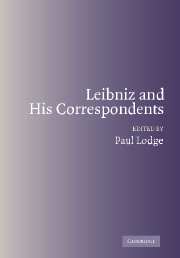Leibniz, who was born in Leipzig and died in Hanover, was one of the greatest intellects of all time. He made significant contributions to a bewildering number of fields of endeavor. Perhaps his most lasting achievement was his discovery of the differential calculus. However, Leibniz also did other pioneering work in mathematics, including the invention of the binary number system, and he wrote works in disparate areas of natural philosophy, from physics and chemistry to geology and botany. He was employed for almost forty years by the court of Hanover as a counselor and charged, among other things to write on a history of the House of Brunswick. In connection with this lengthy project, he collected many documents relating to the history of Europe and the origins of France and Germany. Leibniz also took a serious interest in the Jesuit mission to China, which led to writings on Chinese history and philosophy. He also actively engaged in diplomatic work for much of his career and, as well as producing an extensive correspondence related to issues of state, was a tireless champion of the cause of the reunification of Catholic and Protestant churches. This more practical side of Leibniz's character extended to technological innovation. He invented one of the first calculating machines and spent several years in the mining area of Harz attempting to design and build windmills that served to drain away water.
As a philosopher, Leibniz is perhaps best known for his claim that the actual world is the best of all possible worlds, as lampooned mercilessly in Voltaire's Candide. However, his longevity as a subject of academic study is driven largely by his commitment to the claim that the created world is ultimately composed of an infinite number of unextended, mind-like individuals, which he called “monads.”
Descartes and Cartesianism figure prominently in Leibniz's writings, and it is arguable that much of his philosophy and natural philosophy emerged as a direct response to the Cartesian tradition, which was already becoming dominant by the time he reached his maturity. References to Descartes can be found among the earliest of Leibniz's writings, which date from the late 1660s and early 1670s.
